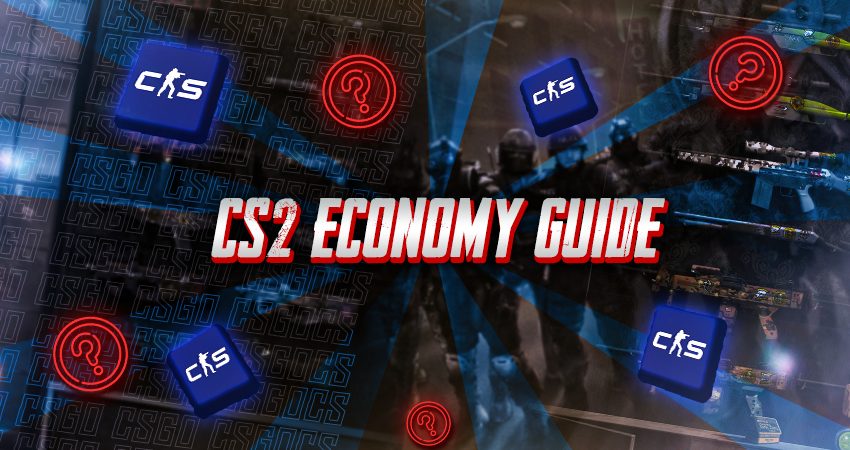

The economy system in CS2 isn’t just an extra feature; it’s a core mechanic that separates skilled teams from casual ones. Managing money effectively can be the difference between winning critical rounds or being forced into awkward saves. Whether it’s choosing when to save, deciding on a force buy, or understanding loss bonuses, understanding the in-game economy is essential for climbing ranks and winning matches.
To stay ahead in CS2, you need a solid understanding of how the economy works and how to make smart decisions round after round. This knowledge can keep your team equipped and ready to compete in every situation.
CS2 Economy Explained
This guide explains everything you need to know about the CS2 economy, including earning money, spending wisely, and avoiding common mistakes. You’ll also get practical tips to keep your team’s resources efficient and maintain stronger buys throughout the match.
Here’s a quick overview of what we’ll cover:
- How CS2 Economy Works: The basics of earning and spending money in matches.
- How to Earn Money in CS2: Actions that add to your in-game cash.
- Important CS2 Economy Terms: Key terms like “eco round,” “force buy,” and “full buy.”
- Important CS2 Numbers to Remember: Buy prices and reward values you should know.
- Top CS2 Money Management Tips: Ways to keep your team’s economy strong.
- Common CS2 Economic Mistakes to Avoid: Missteps that can hurt your team’s finances.
Let’s break it down step by step to help you improve your decision-making and take control of the economy in your matches.
How CS2 Economy Works

In CS2, loadouts aren’t chosen before a match. Instead, the game uses a round-based economy system. Players earn in-game money through their performance and spend it during the 20-second buy phase at the start of each round to purchase weapons, armor, and utilities.

Your economy depends on how you performed in previous rounds. Winning rounds, securing kills, and completing objectives increase your funds, while buying weapons and gear reduces them. Managing your money wisely can make or break your team’s chances in a match.
How to Earn Money in CS2
Earning money in CS2 depends on your performance and the objectives completed during the match. Here’s a breakdown of how you can earn cash during a round:
Kill Rewards

Killing opponents grants different amounts of money depending on the weapon used. Here’s how much you earn per kill:
- Knife: $1500
- Pistol: $300 (except CZ75-Auto: $100)
- Submachine Gun: $600 (P90: $300)
- Shotgun: $900
- Rifles & Machine Guns: $300 (AWP: $100)
- Grenades: $300
- Zeus x27: $0
Round Win Bonuses

Winning a round rewards every player on the team with money. The amount varies based on how the round was won:
- Eliminating all opponents: $3250 for both teams.
- CT defusing the bomb: $3500.
- CTs preventing the bomb plant until the timer runs out: $3250.
- Terrorists detonating the bomb: $3500.
Additionally, the player who plants or defuses the bomb earns a $300 bonus.
Round Loss Bonuses

Teams earn money even when they lose a round. The amount increases with consecutive losses:
- First round lost: $1400.
- Second round lost: $1900.
- Third round lost: $2400.
- Fourth round lost: $2900.
- Fifth round lost and beyond: $3400.
If Terrorists lose the round but manage to plant the bomb, they earn an additional $800 bonus. However, if they fail to plant the bomb and let the timer run out, they receive $0.
Economy Caps and Reset

The maximum cash a player can hold is $16,000. When the match switches sides, all players’ money resets, and they start the second half with the default pistol round economy.
Important CS2 Economy Terms
Economy terms in CS2 are shorthand for the team’s spending strategy for a round. These terms help players communicate efficiently and decide on the best course of action based on their current funds. Here’s a closer look at these strategies, along with examples to clarify when and why they are used:
Full Eco
A “Full Eco” or “Full Save” round is when the entire team spends no money. This is done to save enough cash for a strong buy in future rounds. For example, a team might Full Eco if most players have around $2000 and can’t afford rifles, armor, or utilities. Instead of wasting money, they save it to go all-in during the next round. In these rounds, players focus on survival and possibly dealing small economic damage to the enemy by securing a kill or forcing them to rebuy.
Quasi Buy
A “Quasi Buy” happens when players have just enough money to spend and save at least $2000, ensuring they have enough left over for a full buy in the next round. For example, if the team has a little under $3000, they might buy pistol and a smoke to keep $2000 for the next round. This strategy gives the team some chance to fight back while preparing for a strong round afterward. Quasi Buys are common when Terrorists lose a pistol round but planted the bomb, as this gives them enough money to invest lightly before a full buy in the third round.
Full Buy
A “Full Buy” round is when the entire team can purchase their main loadouts, including primary weapons like the AK-47, M4A1-S, or AWP, along with armor and full utilities. For example, a team might Full Buy when every player has at least $3700 on the Terrorist side (for armor, AK-47, and grenades) or $4100 on the CT side (for M4, armor, and grenades). Full Buys are essential for executing strategies effectively and holding down bomb sites or taking control of key areas.
Force Buy
A “Force Buy” occurs when the team spends all their money, even if it’s not enough for a full loadout. This is often used when the team has less than $1900 and would have to Full Eco in the next round regardless. The goal is to do as much damage as possible to the enemy’s economy. For example:
- After losing the first pistol round as Terrorists, planting the bomb provides a bonus that brings their money close to the CTs in the next round. In this situation, a Force Buy with Galil or SMG and armor is common, giving the Ts a chance to do some serious damage because CTs won’t be able to afford full buy.
- In the last round of a half, teams might also Force Buy since saving money for the next round is pointless.
Important CS2 Numbers to Remember

Making smart money management decisions in CS2 often requires quick calculations. While the math is straightforward, it can get tricky during the fast pace of a match. To make things easier, here are key numbers to keep in mind:
- $3700: Cost of armor, helmet, and an AK-47.
- $4100: Cost of armor, helmet, and an M4.
- $3750: Cost of armor and an M4 without a helmet.
- $1400: Minimum loss bonus, guaranteed in the worst-case scenario.

Having these numbers memorized will help you plan purchases and manage your economy without wasting precious seconds
Top CS2 Money Management Tips
Smart money management in CS2 isn’t just about making the right purchases for yourself- it’s also about supporting your team and countering the enemy’s economy. These tips will help you make the most out of every dollar and keep your team in a strong position.
1. Buy for Your Teammates
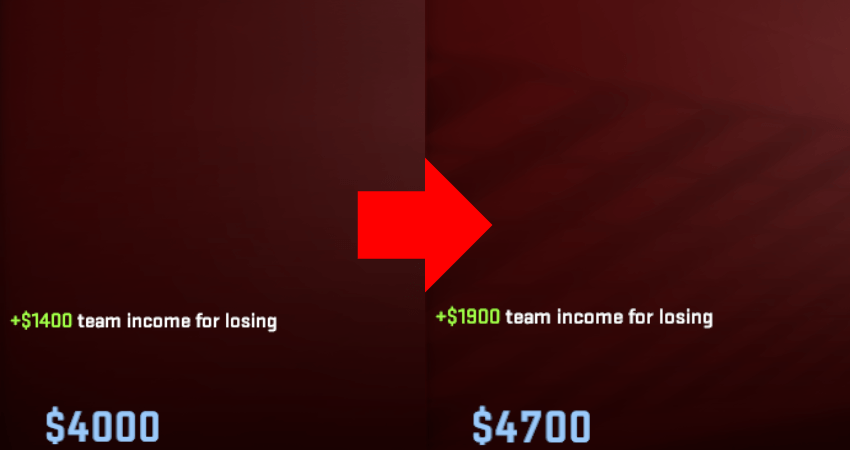
Team coordination is crucial in CS2, and that includes making sure everyone is equipped to perform. Sometimes, it’s smarter to use your extra cash to support a teammate rather than saving it for the next round.
- When to Drop Weapons:
If you have over $6000, prioritize dropping weapons for teammates who are low on cash. For instance, if your AWPer needs their AWP, drop a rifle for another teammate and save them from buying it themselves.
Example:- A teammate with $2000 can’t buy a rifle. Drop a FAMAS or M4 to keep him competitive.
- The Team Advantage:
A well-equipped team has a much better chance of winning a round than a single geared player. Sharing resources ensures your team doesn’t leave gaps in defense or attack. - Effective Communication:
Use voice or chat to coordinate drops and confirm who’s buying what. Avoid wasting money on duplicate purchases by staying organized during the buy phase.
[RELEVANT: CS2 Communication Guide]
2. Adapt to the Enemy Economy

Understanding the enemy’s economy is a critical skill in CS2. Adjusting your strategy based on their financial situation can give your team a huge edge.
- Recognizing an Enemy Eco:
When you know the enemy is on an Eco round:- Stick to SMGs or cheaper rifles like the Galil or FAMAS to farm money.
- Avoid risky plays- keep your distance and hold angles to avoid being overwhelmed by pistol rushes.
- Countering an Enemy Force Buy:
If Terrorists planted but lost, expect them to Force Buy in the next round. Equip grenades to disrupt potential rushes and play cautiously to avoid getting overwhelmed. - Predicting Full Buys:
If you see the enemy with rifles or AWPs, communicate it to your team. Adjust your positioning and utility usage accordingly to avoid losing early duels. - Watch the Loss Bonus:
Keep track of how many rounds the enemy has lost in a row. High-loss bonuses mean they might mix Ecos with Force Buys, so prepare for unpredictable playstyles.
3. Save on Defuse Kits

Not everyone on the team needs a defuse kit. Instead, designate two players to buy them and cover different bomb sites. If they die, call out the location of the dropped kit for teammates to recover it.
4. Know When to Skip the Helmet
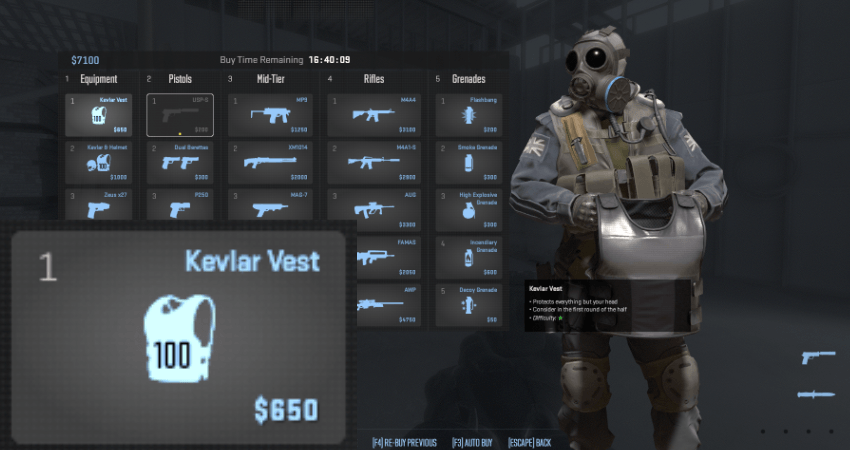
When facing Terrorists with AK-47s or AWPs, skip buying a helmet on full-buy rounds. These weapons are one-shot kills to the head, making the extra $350 for a helmet a waste of money.
5. Don’t Waste Armor

If your armor has points remaining after a round, avoid rebuying it unless it’s under 50 points. Preserving your armor saves money and helps maintain your economy.
6. Use Bomb Plant Bonuses

Planting the bomb gives a $300 bonus, even if your team loses the round. Focus on securing the plant to give your team more cash in the next round.
7. Stick to the Team’s Plan

If your team decides on an Eco, Quasi, or Force Buy, follow the plan. Individual decisions that deviate from the team strategy can cost you the round. A united strategy always has a better chance of success.
Common CS2 Economic Mistakes to Avoid
Even seasoned players make economic mistakes that can cost their team crucial rounds. Here are some of the most common pitfalls to watch out for and avoid in CS2:
1. Ignoring the Economy
Impulse buying is one of the biggest mistakes players make. If you don’t plan your purchases and keep track of the team’s economy, you risk going into future rounds with a weak loadout while your opponents grow stronger.
2. Misusing Eco Rounds
Eco rounds are often seen as throwaway rounds, but they shouldn’t be. Even with minimal resources, you can focus on damaging the opponent’s economy by taking out expensive weapons or forcing utility use.
3. Being Selfish
If you have more money than your teammates, drop them weapons instead of focusing solely on your own gear. A balanced team economy ensures everyone is equipped to contribute effectively in key rounds.
4. Buying the Wrong Utilities
Utilities should align with your role. For example, support players should prioritize smoke grenades over flashbangs, while entry fraggers should carry flashes to assist in site takes.
5. Risking Weapon Saves
Saving a weapon as a CT when you’re outnumbered or in an unwinnable situation is almost always the better choice. Overcommitting to fights in these scenarios often results in losing both your weapon and the round’s bonus money.
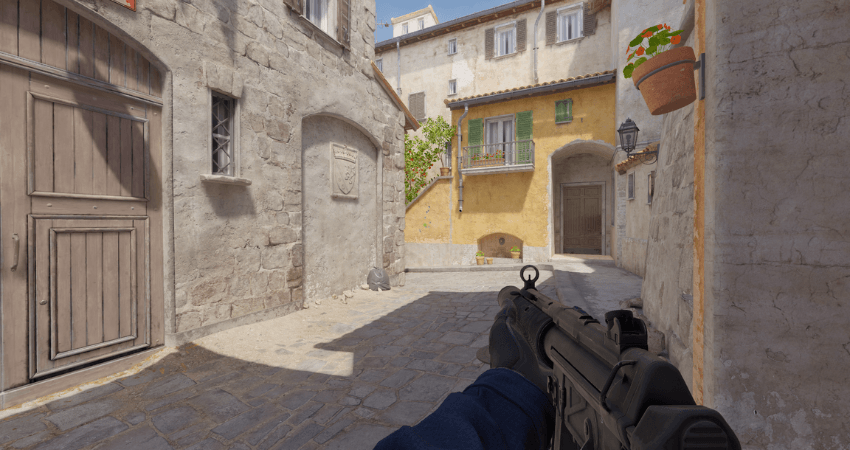
By avoiding these common errors, you can help stabilize your team’s economy and increase your chances of success in the long run. Let’s wrap up everything with a conclusion.
[RELEVANT: How To Get Better in CS2?]
Summary
| Topic | Key Points |
|---|---|
| CS2 Economy System | Money is earned by kills, round wins, bomb plants, and loss bonuses. Players spend cash during the buy phase each round. |
| Earning Money | Kill rewards vary by weapon. Bonuses come from winning rounds, planting or defusing bombs, and consecutive losses. |
| Key Economy Terms | Full Eco (save money), Quasi Buy (partial buy + save), Full Buy (complete gear), Force Buy (spend all with limited funds). |
| Important Numbers | $3700 = armor + AK-47; $4100 = armor + M4; $1400 = minimum loss bonus. Knowing these helps quick buys. |
| Money Management Tips | Drop weapons for teammates, track enemy economy, limit defuse kits, skip helmets vs. one-shot guns, conserve armor, use bomb plant bonus, and follow team buy plans. |
| Common Mistakes | Impulse buying, misusing eco rounds, selfish spending, buying wrong utility, and risking weapon saves in lost fights. |
Conclusion
Managing your economy in CS2 is just as important as aiming or knowing map callouts. A well-planned economy ensures your team has the right gear for critical rounds. From saving on eco rounds to buying for teammates, small decisions can turn the tide of a match.
Stick to the strategies, communicate with your team, and focus on making every dollar count. A strong economy doesn’t just help in the next round—it sets your team up for long-term success.




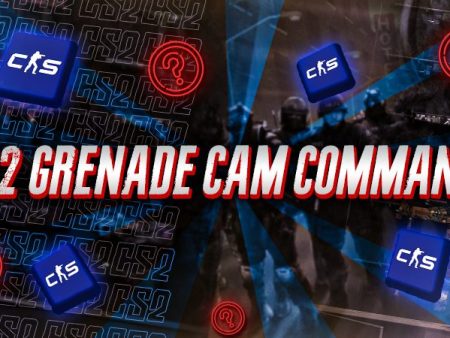


Used to buy whatever felt right each round. This explained the flow way better than any teammate ever did.